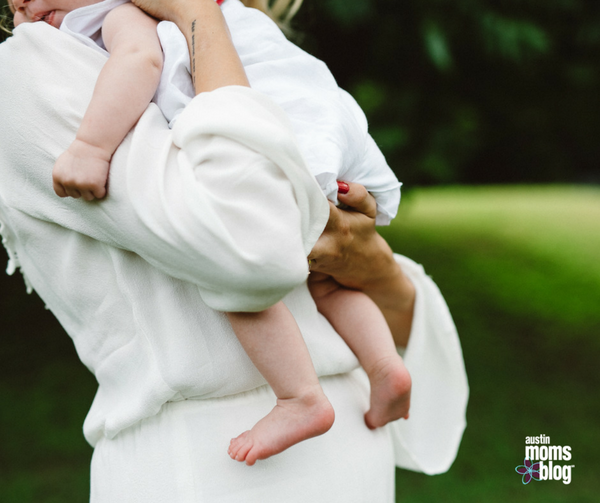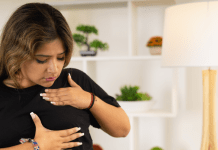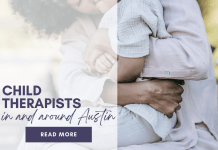 While I was pregnant people would often ask me how I was feeling. They seemed genuinely concerned and willing to listen if my back was bothering me or I was being repeatedly kicked in the ribs by the tiny alien growing inside.
While I was pregnant people would often ask me how I was feeling. They seemed genuinely concerned and willing to listen if my back was bothering me or I was being repeatedly kicked in the ribs by the tiny alien growing inside.
After the baby was born, the phrasing changed. “Are you so excited to be a mom?” they’d ask. “Are you loving motherhood?” I’d smile and nod, “It’s great!” I gave them the answers they expected, the answers they wanted to hear through the phrasing of their questions. I wanted to tell them, “No.” I wanted to tell them this isn’t what I expected motherhood to be. I wanted to tell them I wasn’t loving it, that it was hard. The days were a blur that ended in a sigh of relief that I’d made it. I wanted to ask if it was normal not to feel anything. I wanted someone to look at me with sympathetic eyes and ask, “How are you doing?” and really mean it. I fantasized about it.
I cried a lot those first few weeks but told my mom and my husband, even myself, it was just the baby blues it would pass. You see, I prepared for this. I took every precaution possible to prevent Postpartum Depression. I suffered from depression since I was a teenager but never went on medication as I always felt I was managing. Sometimes my depression left me laid up in bed watching my comfort show late in to the night or kept me in the house for a lost weekend, but I always made it to work. Being that I’d suffered from depression more than half my life, I was high risk for postpartum depression following the birth of my child.
When I tell you I took all possible measures to avoid postpartum depression, I mean it. When the teacher of our birthing class stated that women who work with a doula are less likely to develop postpartum depression, I immediately began working with our wonderful doula, Jamie. When I read that eating your placenta may help reduce the risk for PPD, I made arrangements to have my placenta encapsulated. In hearing that a natural birth releases more oxytocin which helps in recovery and minimizes PPD, I was set on having a natural birth. Breastfeeding, exercising, getting outside–I tried it all.
Perhaps it was all the measures I’d taken to avoid it that made me ignore that it was happening to me. Stuck in the haze of motherhood, I walked the halls of our home like a ghost. The baby was constantly in my arms or bundled to my body but I felt nothing for her. I showed her love externally; I kissed her and hugged her, sang to her and told her I loved her to the moon and back, but inside I was empty and numb. My husband would constantly talk about how great she was but I stayed silent, wishing I could say those words.
I wanted to yell that he didn’t know what it was like to be trapped inside with a baby all day but the truth was, I’d trapped myself. I rarely went out because it felt too stressful. A trip to the grocery store would take a week of planning and getting up the courage. My mind would race with thoughts like what if she started crying there? What if her diaper exploded? What if people can tell I don’t know what I’m doing? So we stayed inside.
When the baby would fall asleep on me at night, I would look obsessively at other moms on Instagram. They looked so happy, babies smiling back at them in bright colored bonnets. When eventually I could push myself to take the baby on outings, I searched desperately for other moms who seemed like they were having a hard time too. I wished someone, anyone would echo me. I wished they would tell me that they too could not feel for their child. I wished they would tell me they cried every day, that leaving their home for an hour was a feat. I wish they would tell me they felt as though everything was crumbling around them but through it all they held their baby and cared for her needs and she was doing just fine. I never did find that other mom.
I can’t remember when I began to feel again but the love I feel now for my daughter overwhelms me. It wasn’t that I didn’t feel love for her in the midst of my depression, it was knowing I loved her, of saying those words but feeling nothing in my body. The feeling I get now, in my whole body, when she runs to me and squeezes me tight overwhelms me so much that I often begin to cry. I cry because I feel it now in every single part of me; from goosebumps on my head from smiling so big to the spreading of my fingertips from joy.
When she was 10 months old I went back to the therapist I’d stopped going to when the pregnancy hormones had overtaken me and I was floating on a cloud of happiness. I looked at her dazed, by then the worst had passed. “I think I had postpartum depression,” I said, listening to the words fall from my mouth.
Following my daughter’s first birthday, I went on medication for the first time. Though I’d been doing better since I started therapy once again, when my husband and daughter went away for a weekend I couldn’t pull myself off the couch. I realized being her mom made me function. This little person was depending on me, I couldn’t sink in to the hole of the bed or couch like I’d done in the past, she needed me. She needed the best me.
When I began taking antidepressants, I realized what it was to be a fully functioning person, something I’d not known how to be most of my life. Little tasks like going to the grocery store could be done on a whim rather than planned a week in advance. Instead of being unable to pull myself up off the floor at the end of the day and counting down the minutes until my husband would come home and help me, I’m wishing the days were longer. I tell my daughter to pick one more story, we laugh until she gets sleepy, and I hold her tighter, watching her eyes flutter to sleep in my arms.
On her first birthday, I once again felt the urge for someone to ask if I was okay, but this time it was so I could tell them that I was. I had made it through the year. I could feel my cheeks turned in a smile once again, my chest puffed up with pride that this was my girl. She was okay, she loves me still. We are okay, I could accept that love and return it. It runs much farther than the moon and back because it runs through my veins, my energy surrounding her with everything I wanted so badly to give.
If you are experiencing symptoms of postpartum depression do not wait to seek help as I did. Symptoms include sadness, irritability, insomnia, mood swings, crying, suicidal thoughts, and inability/disinterest in caring for your newborn. If you have feelings of wanting to harm your baby or yourself call 911 immediately. For more information on postpartum depression visit Pregnancy and Postpartum Health Alliance of Texas. If you are struggling with PPD, you are not alone, join a support group: Any Baby Can, Partners in Parenting, The Circle at Austin Born.









